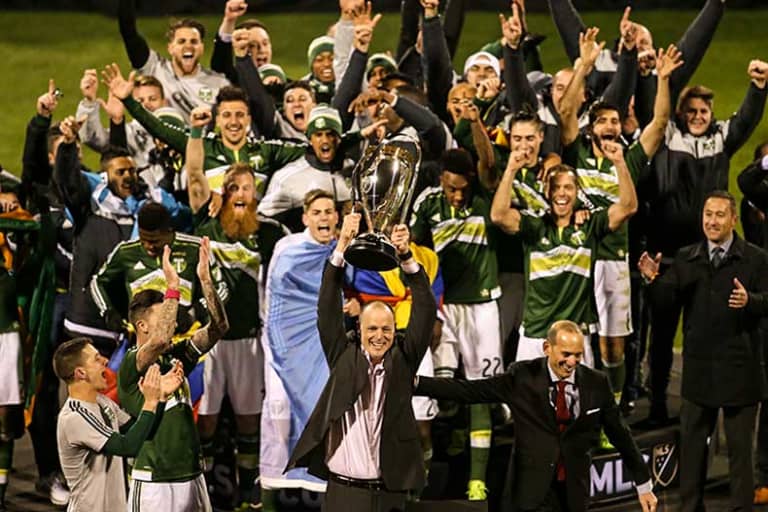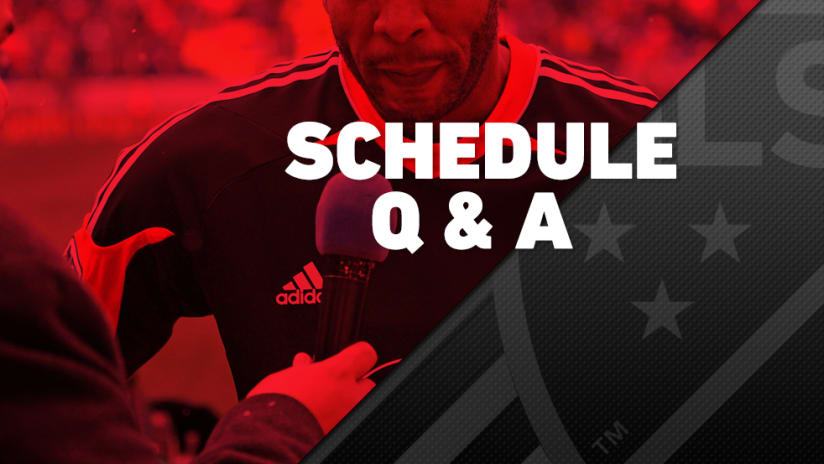It’s here! The 2016 MLS schedule is out. So how does it all come together? It’s a bit of art and science together, and, yes, actual humans are involved. Quite a few of them, in fact. And they’re all coordinated by MLS’s vice president of club services and scheduling, Brad Pursel.
We caught up with him to get the low-down on all of your questions about how the scheduling magic happens.
MLSsoccer.com: So, first question, how many actual humans are involved in this process?
Brad Pursel: This can be answered in a couple different ways. As far as the number of humans involved in actually, physically putting it together, it’s mostly one person. But the individuals involved in the process are numerous, because we coordinate closely with our TV partners; our teams are all involved in the process.
And there are many important folks involved here internally from our executive leaders on the business and competition sides, our broadcasting group, our researching group, our marketing group and our partnership marketing group.
MLSsoccer.com: What is the very first consideration you start with?
Pursel: The two main objectives are to put together the schedule that is the best from a competitive standpoint for the teams, while trying to achieve the best possible national TV schedule as well. Putting together a schedule that is also fan-friendly is a top priority.
MLSsoccer.com: How do you determine which teams get more nationally broadcast games?
Pursel: Many factors are considered and the games are largely based on what our television partners select.
MLSsoccer.com: How much of the scheduling process is “manual,” let’s say, and how much of it is automated, with, say, a computer program?
Pursel: It’s about 50-50. A lot of the blocking and tackling is done manually, if you will – a lot of the key dates with national TV games, opening weekend, Decision Day, Heineken Rivalry Weeks. There are a number of very important television or event-related dates, which are done manually.
But we do have a proprietary scheduling program that helps us handle the competitive priorities that we have, along with our TV priorities and club priorities. The software helps us optimize the schedule based on all of the factors involved.
MLSsoccer.com: How does it work with scheduling around things like the US Open Cup, CONCACAF Champions League, and FIFA dates?
Pursel: FIFA dates are optional for clubs to play on; it’s their choice. From a league perspective, we see the value in having them be honored, meaning no MLS games take place. But we also respect that our teams may want to play on those dates if they’re not going to lose many players to call-ups.
It may deliver them a better schedule based on the rhythm and flow of the whole season. Because if you don’t play on a FIFA date, that means that game will most likely fall into a mid-week somewhere else, which could complicate scheduling and travel. So we allow our teams to decide that based on their preferences.
So that’s from a FIFA perspective. For Open Cups, for US and Canada, we just block out those fixtures. No one can play on those protected dates.
For CONCACAF Champions League, we protect all those CCL fixtures for all of our teams who have qualified. And what we’ve shown during the knockout rounds of CCL that take place in March or April is that, if one of our teams is advancing in the competition, we will look to reschedule an MLS game around that time to give our teams the best opportunity to prepare and perform at their highest level.
MLSsoccer.com: How much of a consideration are other sports leagues?
Pursel: There’s so much of it that you can’t avoid it all. Market by market, we try not to go against big events at the same time. If there’s, say, a big baseball game in a market, say the Astros and the Rangers are playing in Houston, we would try to avoid a home game for the Dynamo. It is a consideration, but there’s just so much going on in the US national sports landscape that it’s hard to totally avoid.
MLSsoccer.com: What’s one of the most unusual things you had to schedule around this year?
Pursel: Well this year, for 2016, Copa America Centenario. We are treating it similar to a World Cup year – it’s in the United States, and it will attract a lot of interest and soccer fans. We also want to minimize conflicts as many of the games are in MLS markets, and many of our players will be called up to participate with their national teams. So we’re taking two weeks off at the beginning of June during group phase play of the competition.
MLSsoccer.com: How does the weather in northern markets figure into the March and April parts of the schedule?
Pursel: For the first two weeks, we try to have the season open with some of the more warm-climate teams hosting. You can see that in our annual schedules.
But some of that is based on stadium availability, as well. Because of that, we may end up with a colder-weather market hosting a game on opening weekend.
MLSsoccer.com: How are the byes assigned?
Pursel: We try to limit byes as much as possible. If there are byes, sometimes it’s strategic, like for clubs playing CCL to have a bye next to a CCL fixture and sometimes it’s random based on all of the scheduling factors that come into play.
MLSsoccer.com: What’s the story with Friday-night games this year? How many are being played at 6 pm?
Pursel: They are Fridays at 7 pm ET on UniMas. There are two that are 6 p.m. local – one in Kansas City, and one in Houston. There are about the same number of Friday-night UniMas games as there were last year.
Houston had one at 6 pm local game last year against Orlando City and they sold out. This year they’re playing the LA Galaxy, so they expect another sell-out for that one, too. Sporting KC will sell out their game as well continuing their impressive streak.
MLSsoccer.com: Do the UniMas broadcasts tend to specifically favor teams with large Latino markets?
Pursel: Yes. We work closely with UniMas. They have targeted markets that have higher Hispanic populations that they target with their schedule.
MLSsoccer.com: Let’s talk opening day really quick. Some of the match-ups are really dramatic – we basically have an MLS Cup re-match happening in Portland. How did all those games come to be?
Pursel: We wanted to make opening day special, so we waited until the MLS Cup game was completed so we knew who the champion was. Working with ESPN, we thought it would be a dramatic way to start the season with a re-match, especially in Portland, with one of our best atmospheres.

Then with the Canadian match-up, with Montreal and Vancouver playing each other, we wanted to start off with a strong match-up for our TV partners in Canada, TSN and RDS.
Seattle-Kansas City is just a strong match-up, and featuring a match from Seattle is always great.
Then it caps with the 10 pm UniMas game with two of our most storied clubs with many MLS Cup championships between them. We wanted to have D.C. United and the LA Galaxy finish off the day.
It’s a terrific way to kick off the season.
MLSsoccer.com: Any last words to fans about the schedule?
Pursel: I think everybody knows it’s complicated process. Of course we want to be quicker to release the schedule, but we need to wait until the MLS Cup champion is determined so we know all the teams who have qualified for CCL. That’s an important factor in putting together the overall schedule.
Scheduling around Copa America Centenario, which will be a fantastic competition, it just presented some challenges to work around.
Overall the 2016 schedule has come together nicely and I think everyone will be pleased. Should be another great season for MLS!











